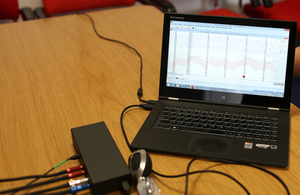Compulsory lie detector tests for serious sex offenders
The UK’s first school for training highly-skilled probation officers to become lie detector examiners is underway.

Polygraph laptop
Sex offenders on licence will now face some of the world’s toughest approaches to supervision, Justice Minister Jeremy Wright said today.
Probation officers have begun rigorous training to become polygraph examiners, putting some of the most serious sex offenders in the community under stringent tests. Around 1,000 will undergo the compulsory lie detector tests designed to make sure they are sticking to their licence conditions.
The lie detector is the latest in a series of plans to tighten up controls on sex offenders, which will also see their every movement tracked by satellite tags, when the technology is available. Libido suppressant drugs can also be prescribed to further reduce the risk posed by this group of offenders.
The polygraph training is being delivered by Behavioural Measures, led by Don Grubin, Professor of Forensic Psychiatry at Newcastle University. Probation officers from the new National Probation Service (NPS) are undertaking the rigorous 12 week training programme, including intensive learning and regular assessments, to qualify as Polygraph Examiners.
Jeremy Wright said:
This government is introducing lie detector tests for high risk sexual offenders, as well as satellite tagging to track their movements.
We are determined that the UK has one of the toughest regimes in the world for managing sex offenders, to stop reoffending and to protect victims.
Compulsory lie detector testing will start from October 2014, once the training has been completed.
This testing will be in addition to existing licence conditions which can include, signing the sex offender register, exclusion zones, non-contact orders, curfews, internet restrictions and compliance with sex offender treatment programmes. Offenders will be required to take the test every six months and, if found to have been covering up inappropriate behaviour, they are likely to be recalled to prison.
On the examinations, Professor Don Grubin said:
Polygraph tests can be an important tool in the management of sex offenders and can enhance provisions already in place.
Previous studies have shown that polygraph testing both facilitates the disclosure of information and alerts offender managers to possible deception, allowing them to work with offenders in a more focused way.
Under our reforms to transform rehabilitation, the NPS will be tasked with supervising more than 37,000 sexual and violent offenders.
Notes to editors:
- For further information, please contact the MOJ press office on 020 3334 3536.
- Legislation was introduced in July 2013 to implement polygraph testing for sexual offenders who are assessed as being a high risk of reoffending and a high risk of serious harm. The tests are now being rolled out nationally following a pilot in the East and West Midlands between 2009 and 2011.
- Mandatory polygraph testing for post-custodial sexual offenders was piloted between April 2009 and October 2011 in the East and West Midlands probation regions. The study found that offenders who took the tests made twice as many disclosures to probation staff – for instance, admitting to contacting a victim or entering an exclusion zone, or thoughts that could suggest a higher risk of reoffending. Read the evaluation of the study.